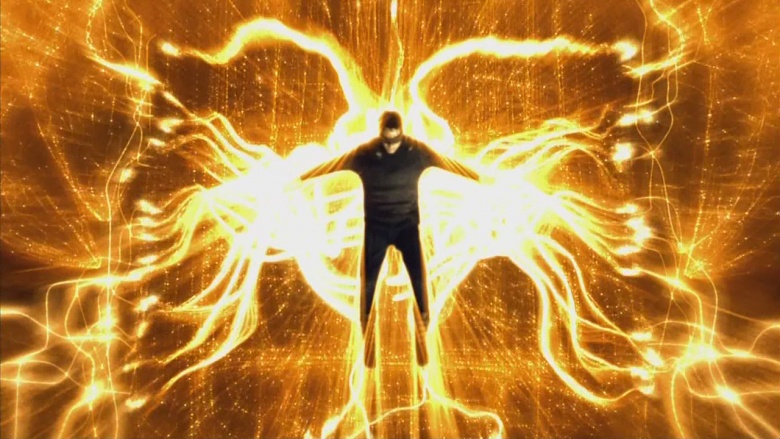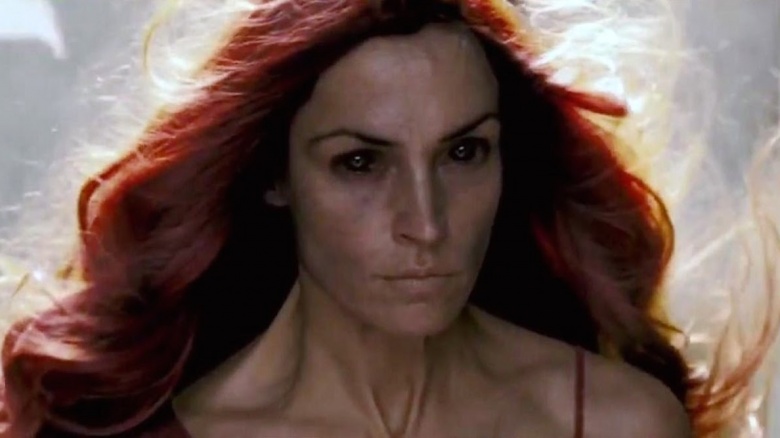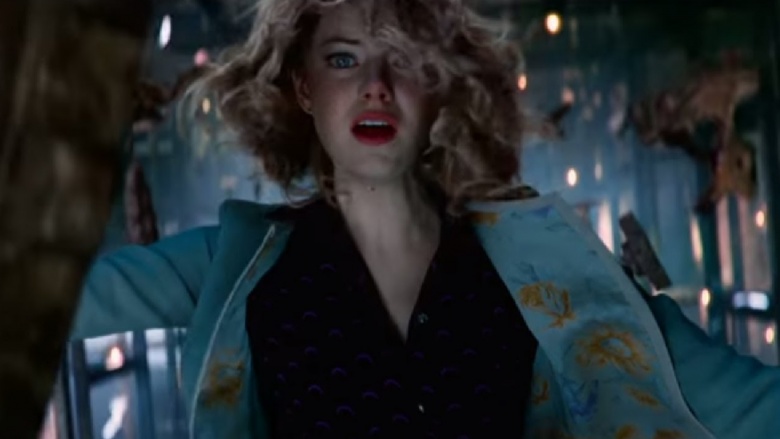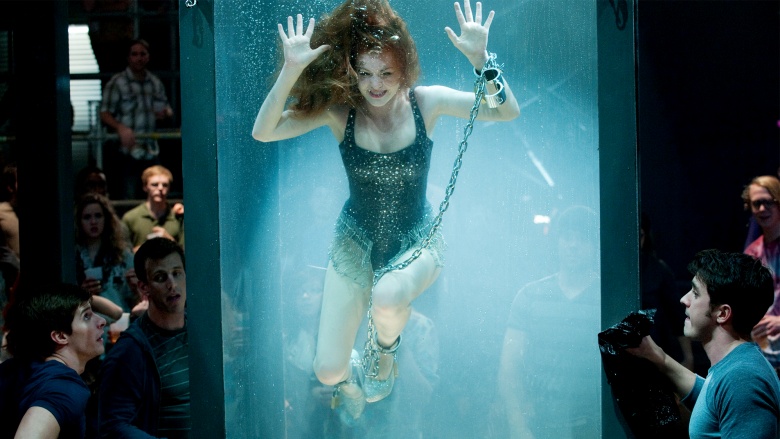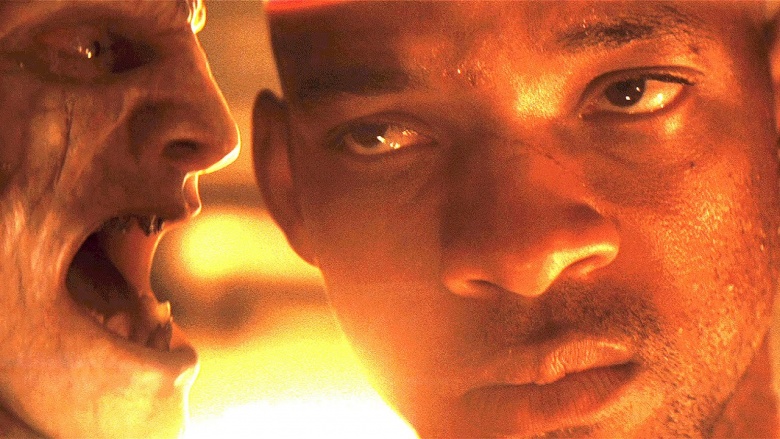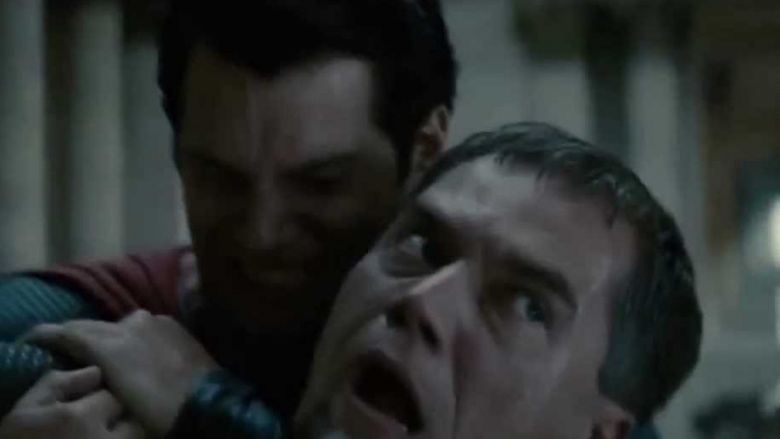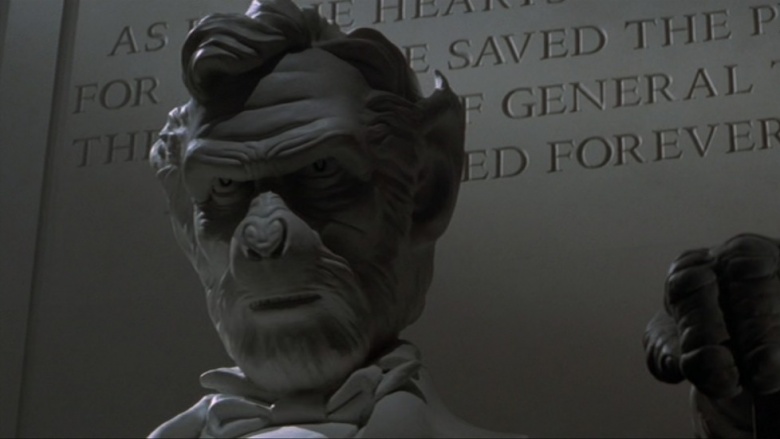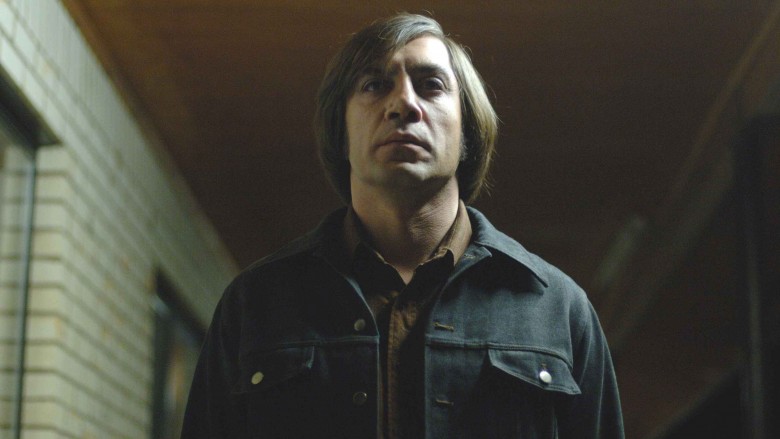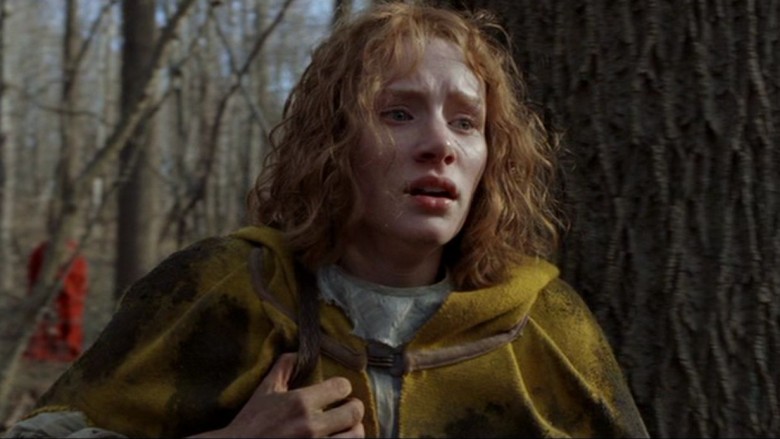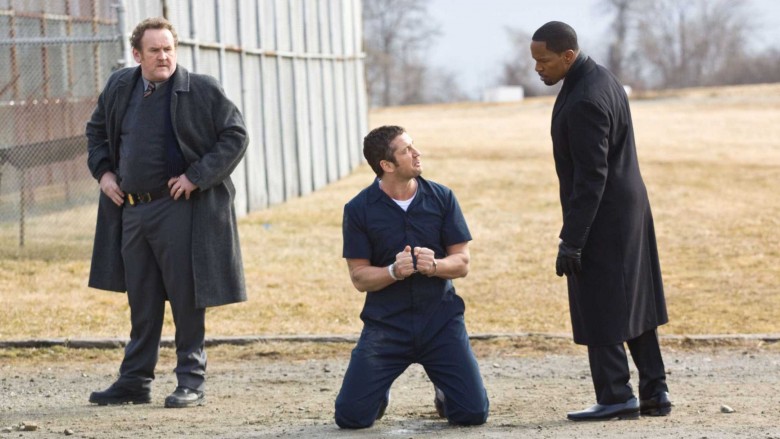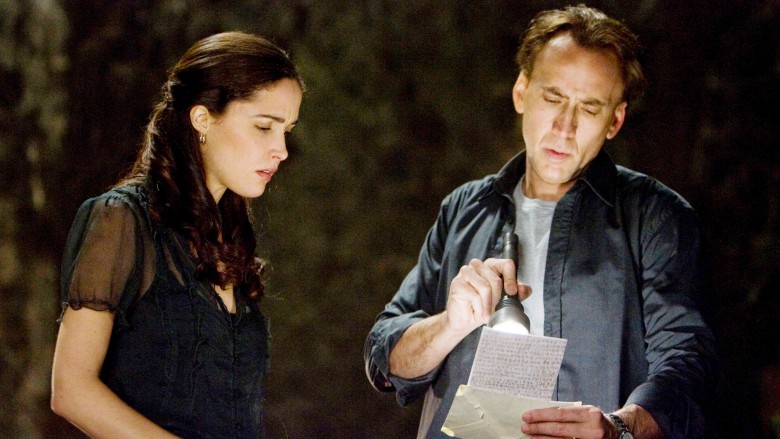The Most Infuriating Movie Endings Of All Time
No one likes to see a cheesy set, hear poorly written dialogue, or suffer through an unintentionally hilarious action sequence. But if you ask a group of film fans to rank the most irritating aspect of a failed film, most of them will probably agree that there's nothing quite as frustrating as a bad movie ending. Failure to stick that landing in the final act can sour our enjoyment of an otherwise great film, or give us one more reason to loathe one that was already a dud. You're invested in the story, you're waiting to see how things end up working out for the characters you've followed along the plot arc, and then wham — it all falls apart in the last few moments, tainting the rest of the movie beyond repair. With that in mind, here's a look at some of the most unsatisfying Hollywood endings in recent memory. Spoilers ahead...
Matrix Revolutions
The Matrix trilogy always tried to be more of a thinking person's action flick than your average kung fu technothriller, so it didn't exactly come as a surprise when the second and third installments grew more and more ponderous as they grappled with the heavy subtext underneath all the punching and kicking. Still, it came as a crushing disappointment when the trilogy concluded in a confusing blur that went from hand-to-hand combat directly into poorly explained Eastern mysticism. If you need fan sites and message boards to untangle the ending of your trilogy, you're doing it wrong.
X-Men: The Last Stand
With the third film in the X-Men franchise, screenwriters Simon Kinberg and Zak Penn tried to bring the comics story of the Dark Phoenix, the force that consumed and killed Jean Grey (for awhile), to the big screen. Budget and studio limitations, however, prevented them from truly adapting the tale, and what viewers were left with was a bunch of gobbledygook that rendered the deaths of crucial characters virtually meaningless while undoing the movie's big emotional moment with a confusing post-credits stinger. It made money, but The Last Stand was so despised that it sent the franchise into limbo for years, and the events of the plot were purposely undone in X-Men: Days of Future Past.
Signs
Countless movies have depicted hostile aliens invading Earth, yet it's a story that continues to be told, mainly because it's so effective that you've got to really go off the rails in order to screw it up. Sadly, that's just what M. Night Shyamalan did with Signs, a solidly cast and largely effective alien thriller that goes soaring right off the cliff as soon as it's revealed that our uninvited intergalactic guests' big weakness is...water. Wouldn't you think that if a species was advanced enough to travel across the galaxy and take over a planet, they'd pick one that wasn't covered with stuff that would kill them?
The Amazing Spider-Man 2
What do you get when you try to depict one of the most emotional moments in a comic book character's history while also setting up a slew of studio-mandated spinoffs? Why, it's the last act of The Amazing Spider-Man 2, which killed off Emma Stone's Gwen Stacy as part of a rushed climax that also dealt with the twin dangers of Electro and the Green Goblin before teasing Sony's planned Sinister Six standalone feature. Like a lot of subpar superhero movies, it all ended up being a lot of noise with not enough emotional impact, and the negative response sent the franchise back into reboot mode.
AI: Artificial Intelligence
A.I.: Artificial Intelligence was probably doomed to be a polarizing project from the moment Steven Spielberg took the reins from his late friend Stanley Kubrick. No matter how great a job Spielberg might have managed to do, film fans would almost certainly have spent years debating whether he'd truly captured Kubrick's original intent. It's that much sadder, then, that Spielberg made a mess of things with his ending, which struck many viewers as a tacked-on gob of sentimental goop that messed up the heartrending darkness that came before it. Fittingly for a Kubrickian film, there are differing schools of thought about A.I.'s closing scenes, but their ambiguity remains out of place against what's largely a fairly straightforward (yet still thought-provoking) story about a self-aware computer desperately seeking fulfillment within the constraints of his programming.
Now You See Me
There's nothing quite as frustrating as a dumb movie that thinks it's smart, and Now You See Me is a perfect example of this principle in motion. Films that rely heavily on sleight of hand and double-crossing can only get so far before they have to ante up with something resembling an actual story, and this stylishly inane caper flick is ultimately hiding absolutely nothing up its sleeve. The final act, in which Mark Ruffalo's FBI agent character reveals himself to be the shadowy figure behind a secret order of magicians, is the absurd, insulting capper to a genuinely terrible cinematic ordeal whose chief value is serving as a warning to audiences who believe a great cast means a great film.
I Am Legend
They say the third time's the charm, but that sadly proved not to be the case for Richard Matheson's classic novella I Am Legend. After badly bungling a pair of adaptations (The Last Man on Earth in 1964 and The Omega Man in 1971), Hollywood had a chance to finally get it right with I Am Legend in 2007. Unfortunately, even after more than 40 years, Matheson's tale of a scientist who lives a harrowing existence as the last man on Earth after a vampire-like plague still turned out to be too dark for studio execs. Of specific concern was the story's final act, in which the main character comes to understand that instead of serving as humanity's brave final gasp, he's actually a monster in the eyes of the planet's new civilization. After test screening audiences rejected the original ending, director Francis Lawrence had to reshoot it, thus turning a potentially thought-provoking picture into just another orgy of CGI mayhem.
Man of Steel
Disdain for Man of Steel's ending is far from universal, and some fans are willing to go with director Zack Snyder's defense of the over-the-top climactic battle that ends with Superman snapping General Zod's neck. For those who grew up with these characters, however, it's an offensive and downright unnecessary reversal of one of the things that made Superman special: his refusal to commit murder. Judging from the box office numbers, audiences love the "dark and gritty" aesthetic that took hold at DC after Christopher Nolan's Batman movies, but not every superhero has to be wedged into that mold...and Superman definitely doesn't belong there.
Planet of the Apes
Remaking The Planet of the Apes was going to be a thankless task no matter how Tim Burton went about it. And unfortunately, in attempting to pay homage to the classic that launched a massive franchise, he ended up with a big-budget spectacle that felt like little more than a pale imitation (with admittedly superior special effects). Worst of all was Burton's Apes ending, which tried to one-up the shocking final moments of the original, in which our hero discovers that instead of the alien planet he believed he was on, he's actually been sent to a future Earth where apes took over after a nuclear war. Instead of copying the first Planet's final shot of a ruined Statue of Liberty, Burton attempted a twist, sending his human protagonist back in time, where he found that the villainous ape Thade had somehow gotten there first and made himself a world leader. Less surprising than perplexing, this ending has been singled out as the worst of all time. And even if it isn't, it's still a great example of what can happen when movies are made with more dollars than sense.
Lord of the Rings: The Return of the King
Generally speaking, there's nothing wrong with the way the Lord of the Rings saga concludes. Our hero completes his quest, the bad guy is defeated, and everyone lives happily ever after. Yet even after hours and hours of trudging through Middle-earth, director Peter Jackson was obviously in no hurry to roll those end credits. For proof, look to the series of scenes that slowly plays out over the last act of The Return of the King. Again and again, we feel like we're watching the end of the movie, only to find ourselves sitting through yet another leisurely look at life after the fall of Sauron. Instead of feeling satisfied at the end of a story well-told, we hurt our eyes rolling them while Hobbits jumped on a bed in slow motion. Just look at this thing.
No Country for Old Men
The Coen brothers have created a number of cult classics over the years, but the 2007 neo-Western flick No Country for Old Men ranks among their greatest productions ever—although one thing holding it back for many people is its divisive ending.
After a long-winded hunt for $2 million in drug money, with three parties—a sheriff (Tommy Lee Jones), a veteran (Josh Brolin), and a hitman (Javier Bardem)—all searching for the loot, the rather quiet ending feels anticlimactic for some viewers. Two major deaths occur offscreen, and as Bardem's Chigurh drives away in his truck, he gets into a sudden car accident that plays out like a deus ex machina.
Brolin knows the ending angers people, and he thinks that's actually a good thing. "I love that people are talking about this movie. I love that people leave the movie saying, 'I hate the ending. I was so pissed.' Good, it was supposed to piss you off," he told MTV News. "You completely lend yourself to [my] character and then you're completely raped of this character. I don't find it manipulative at all. I find it to be a great homage to that kind of violence."
The Village
Newsweek once had M. Night Shyamalan pegged as "the next [Steven] Spielberg." It sounds a little absurd now, but back then, Shyamalan was a hot streak with Unbreakable, The Sixth Sense, and Signs...and then came The Village. Although this moody thriller featured a well-rounded cast—including Bryce Dallas Howard, Adrien Brody, and Joaquin Phoenix—they couldn't save it from its infuriating ending.
In the film, the Elders of the village Covington taught residents to be fearful of monsters living in the woods. The unlikely narrative was meant to keep Covington's inhabitants from ever venturing beyond their oil-lamped barrier—until one member needed medicine they didn't have, so the Elders sent Howard's Elizabeth Walker to the city. When she got there (or close enough), it was revealed that what seemed to be a period picture really wasn't—the village actually existed in the present day.
In one of Shyamalan's least satisfying twists, the Elders turned out to have met each other in grief counseling sometime in the 1970s, and decided to leave society (and all their belongings behind) to begin anew as a late 19th century-style community. It isn't so bad until you think about the implausibility of the village remaining a secret in the modern day, even with Shyamalan's thought-out explanation.
Buried
Ryan Reynolds has repeatedly proven to be a great comedic actor, but he's also been known to show his dramatic chops on occasion—as in Rodrigo Cortes' movie Buried, in which he plays Paul Conroy, a civilian truck driver working in Iraq. Attacked and buried alive inside a coffin, Conroy only has a handful of items to help him escape his perilous situation, including a lighter and a cell phone. Conroy uses the phone to call the U.S. State Department, who attempt to find Paul's location. Unfortunately, they never find the coffin, and Paul dies knowing no one is coming to rescue him.
The movie has been heavily criticized for its ending—the gut-wrenching realization that Conroy will never be found, that he'll die in that coffin. It's not an ending people were expecting, or one that audiences are used to, and that's precisely why it's infuriating to watch—everyone wants a happy ending, and Buried's outcome is anything but.
Inception
Christopher Nolan's Inception concluded on one of the most talked-about ambiguous notes in recent memory. Starring Leonardo DiCpario as the leader of a corporate espionage team able to enter its targets' dreams, this mind-bending adventure posits that anyone who enters another person's dream has to carry a totem. Once they awaken, they use that totem to determine whether they're still sleeping; however, if someone touches another person's totem, it becomes tainted, and that person may never know if they're truly awake.
Nolan emphasizes the importance of totems (and the importance of keeping them safe) throughout the entire story, up until the very end. DiCaprio's Cobb awakens on a Los Angeles-bound plane after spending an unknown amount of time in Limbo, the lowest level of the dream state, searching for Ken Watanabe's Mr. Saito. When he arrives in the United States, he goes through customs without any issues and finally reunites with his family.
In the final scene, Cobb sits down with his totem, a top, and sets it spinning on a table—and the movie abruptly ends just as the audience is about to discover whether it's been tainted, and whether Cobb was actually awake. It's a question Nolan's been asked countless times over the years, and one he'll most likely never answer. "There can't be anything in the film that tells you one way or another because then the ambiguity at the end of the film would just be a mistake," Nolan told Entertainment Weekly. "The real point of the scene—and this is what I tell people—is that Cobb isn't looking at the top. He's looking at his kids. He's left it behind. That's the emotional significance of the thing."
Law Abiding Citizen
The entire premise of Law Abiding Citizen hinges on the notion that the broken justice system doesn't always work—and it certainly doesn't benefit the good guys. Gerard Butler's Clyde Shelton experiences that injustice firsthand, which is something he attempts to project onto those involved with the system by torturing and killing the man who murdered his family, then turning himself in. Of course, to further point, he convinces the judge to let him out on bail, which he finds ridiculous since he confessed to murder. And so begins a story of a man hellbent on proving that lawyers like Jamie Foxx's Nick Rice are what's wrong with American justice.
Throughout the movie, directed by The Fate of the Furious' F. Gary Gray, Clyde commits a series of killings that leaves Rice scrambling. It all ends with Clyde returning to his cell, having placed a bomb in city hall, only to find Rice waiting for him. Rice finally understood Clyde's lesson: never make deals with murderers. But to solidify his point, Clyde attempts to detonate the bomb, only to discover that Rice moved the device from city hall to his cell. He unwittingly kills himself—and the filmmakers turn the entire movie's story on its head. Clyde killed out of necessity to prove his point, and Rice was acting like a law abiding citizen. The ending is a total reversal for both characters, and for a number of viewers, it cheapens the story.
Knowing
You never know what you'll find when you open a time capsule after 50 years, but you certainly wouldn't expect a piece of paper with a bunch of seemingly random numbers written on it. And it'd be even more implausible if those numbers predicted a string of major disasters (or accidents) that eventually led into a world-ending event. That's also the basis of Alex Proyas' Knowing, starring Nicolas Cage as John Koestler, the MIT professor leading the charge in deciphering the fateful digits.
It's an intriguing premise, fiction film, and Knowing could have been great—if it ended differently. In the movie, right before the planet is destroyed, aliens take Koestler's son and Diana Wayland's (Rose Byrne) daughter off to an Earth-like planet, presumably to lay the foundations for a new human society. They're last seen running towards what appears to be the Tree of Life.
Just as there are people who despise the ending, there are also those who defend it. Its determination to follow through with the apocalypse means the buildup wasn't for naught. But after nearly two hours of the movie grounding itself with science, the final act's sudden pivot into more fantastical elements feels completely out of place.
Remember Me
After achieving worldwide fame by playing a sparkly vampire in The Twilight Saga, Robert Pattinson attempted to change his public perception and prove his acting skills by starring in director Allen Coulter romance Remember Me. The movie follows Pattinson's Tyler Hawkins and Emilie de Ravin's Alyssa Craig as they carry on a passionate relationship against the wishes of their fathers. After a drawn-out story, Tyler and his father, Charles, come to terms with the death of Tyler's older brother, Michael, and Ally reconciles with her overbearing father, Neil. Then...the twist.
The morning after Tyler and Ally confess their love for each other, Tyler agrees to meet his father. Charles tells Tyler that he'll be late because he was dropping off Tyler's sister, Caroline, at school. Tyler agrees to wait at Charles' office. The camera shows Caroline's teacher writing the date on the blackboard: Tuesday, September 11, 2001. The camera then cuts to Tyler and zooms out, revealing that his father's office is located on the 101st floor of the World Trade Center.
Incorporating the 9/11 attacks into an otherwise ordinary romance left a lot of viewers crying exploitation. The ending is actually what gives the film its title—you go in fairly certain someone's going to make an irrevocable departure—but leaning on a real-life tragedy to tug at the heartstrings is still pretty tasteless.

